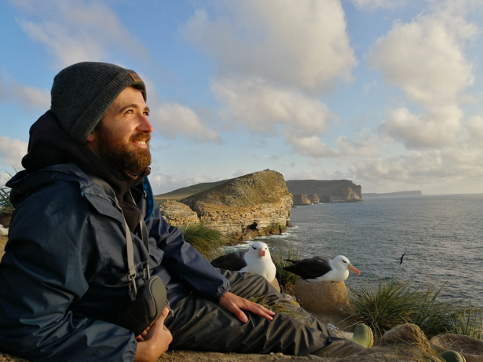Seminar Dynamic soaring in the winds of change. The effects of wind and oceanography on the population and spatial ecology of seabirds
A joint CEAUL / CE3C / MARE seminar
(And a guest lecture for the Modelação Ecológica MSc @FCUL course)
Dynamic soaring in the winds of change. The effects of wind and oceanography on the population and spatial ecology of seabirds.
Francesco Ventura
Tuesday, 18th October 2022 – 14:00h @ FCUL room 1.2.26
Seabirds are marine top predators regarded as indicators of the environmental changes occurring in their supporting ecosystems. Seabirds belonging to the order Procellariiformes have similar life-histories characterised by high life expectancy and delayed sexual maturity. Despite acting as central place foragers during breeding, most procellariiform seabirds cover thousands of kilometres by extracting energy from the wind through a flight behaviour known as "dynamic soaring". The overarching aim of my research is to understand the pathways through which wind and oceanographic processes affect the demography, population dynamics, foraging ecology and spatial distribution of seabirds.
Using integrated population models, we investigated the effects of wind and oceanographic 0uctuations on the population breeding and survival processes of the black-browed albatross (Thalassarche melanophris). By analysing a demographic database spanning nearly two decades, we found that the population breeding parameters were negatively impacted by higher sea surface temperatures and positively affected by stronger winds, presumably through bottom-up environmental processes modulating food availability and accessibility. Survival was relatively constant and was only influenced by deeper ecosystem changes acting at larger spatio-temporal scales. Furthermore, our results revealed the high sensitivity of the population to the survival rate of the poorly understood sub-adult life history stages, which comprised approximately half of the total population size.
By developing state-space models, we quantified a previously hypothesised, but never empirically documented "habitat-mediated" pathway linking environmental conditions to the breeding processes of a social monogamous population. Specifically, we found a higher prevalence of divorce in challenging years characterised by warmer sea surface temperatures, documenting the direct disruptive effects of ocean warming on the social monogamous bonds of albatrosses.
Our work then focussed on the hypermobile Desertas petrel (Pterodroma deserta) and Bulwer's petrel (Bulweria bulwerii) as model organisms to investigate role of winds in shaping the flight behaviour and foraging ecology of dynamic soaring seabirds during breeding. Desertas petrels used favourable winds to maximise their ground speed and distance covered throughout their round-trip foraging movements, among the longest recorded in any animal. Bulwer's petrels, on the other hand, exploited the stable North Atlantic trade winds and exhibited a striking selectivity for crosswinds. Under stable winds, this strategy enabled them to maximise the distance travelled and the probability of detecting odour plumes along the round trip. Crucially, the movement patterns of these two species suggest that seabirds have a priori knowledge of the regional winds and can plan their round-trip with an expectation of predicted wind conditions and costs of flight to return back to their colony.
Collectively, the findings of my work highlight the sensitivity of seabirds to changes in oceanographic conditions and their reliance on winds. Given the accelerating pace of global change and its dramatic effects on marine ecosystems, monitoring the diagnostic responses of these "sentinels" of the global ocean and, crucially, predicting their future performance is a conservation goal of upmost importance.
Short bio
Francesco Ventura is a marine ecologist and conservation biologist working on the spatial and population ecology of marine megafauna, based at the University of Lisbon, Portugal. His current research focuses on the role of the environment in shaping population processes and spatial distribution of seabirds. More specifically, he has spent most of his recent past counting albatrosses, dodging penguin bites and pulling stunts on R. You can find him on Twitter @FraVentoora

